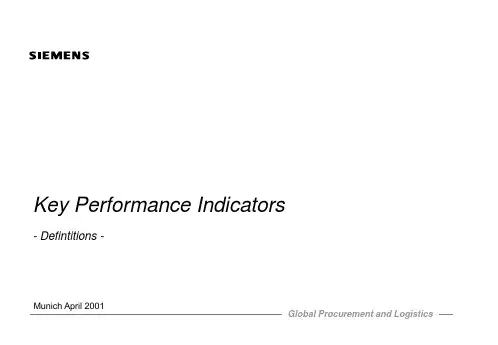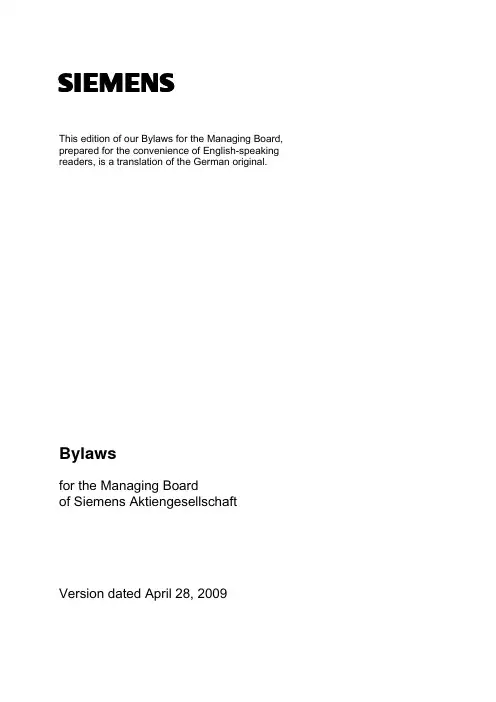西门子供应链课件英文版
- 格式:pptx
- 大小:584.83 KB
- 文档页数:32











sThis edition of our Bylaws for the Managing Board, prepared for the convenience of English-speaking readers, is a translation of the German original.Bylawsfor the Managing Boardof Siemens Aktiengesellschaft Version dated April 28, 2009General(1) The management of the company shall be the Managing Board's ownresponsibility. The Managing Board is under an obligation to promote the company's interests and drive sustainable growth in enterprise value.(2) The members of the Managing Board shall manage the business of thecompany in accordance with the law and in accordance with the Articles of Association and these Bylaws.(3) The Managing Board shall ensure compliance with all relevant legalrequirements and internal company policies, and promote such compliance in all Siemens companies. It shall ensure appropriate risk management and risk controlling.(4) Members of the Managing Board shall not, as a rule, be over 65 years of age.§ 2Conflicts of interest(1) When making their decisions, members of the Managing Board may not beguided by personal interests nor may they exploit for their own advantage business opportunities offered to the company. Over and above the provisions specified in § 88 German Stock Corporation Act (AktG), the members of the Managing Board shall be subject to a comprehensive prohibition on competitive activity for the period of their membership of the Managing Board and the period of their contract of employment.(2) In connection with their function, the members of the Managing Board maynot demand or accept gifts or other benefits from third parties either for themselves or for other persons, or grant unjustified benefits to third parties. (3) The members of the Managing Board are under an obligation to disclose anyconflicts of interest without delay to the Chairman of the Supervisory Board and to inform the others members of the Managing Board thereof. The Chairman of the Supervisory Board shall inform the Chairman's Committee of the Supervisory Board of the conflict of interest on the part of a member of the Managing Board when the relevant issue is presented to the Supervisory Board for a decision. All transactions between the company or an entity related to the company on one side, and members of the Managing Board or persons, companies or organizations related to members of the Managing Board on the other side, must be conducted in accordance with the standards that would apply in arm’s length transactions. If an individual transaction of this kind does not require the involvement of the Supervisory Board pursuant to § 112 German Stock Corporation Act (AktG) but the value of the transaction concerned exceeds € 25,000, the transaction shall nevertheless require the consent of the Supervisory Board.Allocation of business responsibilities(1) The responsibilities of the Managing Board shall be allocated among anumber of portfolios, these being the portfolio of the President of the Managing Board, known as- Chief Executive Office,the three Sector portfolios (Sectors),- Energy- Industry- Healthcare,and the five corporate function portfolios,- Finance and Controlling- Legal and Compliance- Human Resources (“Arbeitsdirektor” as defined in the German Codetermination Act (MitbestG))- Technology- Supply Chain Management.(2) Any other allocation of business responsibilities to the members of theManaging Board shall be derived from the business allocation plan as defined by the Supervisory Board based on a proposal by the Chairman’s Committee of the Supervisory Board. As the member of the Managing Board with responsibility for the Human Resources portfolio, the “Arbeitsdirektor” shall be appointed in accordance with the requirements of § 33 German Codetermination Act (MitbestG).(3) The Divisions, Cross-Sector Businesses and Corporate Units assigned to theindividual Managing Board portfolios and the portfolios holding authority and responsibility for the Regions shall be defined in the business allocation plan agreed by the Supervisory Board in accordance with paragraph 2.(4) Within the framework of the resolutions of the Managing Board and inconformity with the provisions for collective responsibility pursuant to Section 4, the Sector portfolio holders shall be responsible for conducting business activities in their respective Sectors. In particular, they shall be responsible for all the development, production and sales activities in these areas and for the profit or loss from their business activities.(5) In conformity with the provisions for collective responsibility pursuant toSection 4 and as defined in greater detail by the Managing Board, the duties of the corporate function portfolios shall include guidelines, monitoring andcoordinating responsibilities for all parts of the company. The heads of the Finance and Controlling, Legal and Compliance, Human Resources and Supply Chain Management portfolios shall have an unrestricted right to issue instructions in relation to their function across all parts of the company. This shall also apply – to the extent permitted by law – to the heads of units that form a separate legal entity and to the heads of Siemens companies outside Germany.(6) The detailed delineation between the Sectors and Divisions and thebreakdown of the Divisions into Business Units shall be specified by the Managing Board. The same shall also apply to the definition of Cross-Sector Businesses, Cross-Sector Services and Corporate Units. The Supervisory Board shall be informed of the definitions established in accordance with sentences 1 and 2. Within the framework of the applicable provisions of the Codetermination Law, the employee representatives are to be consulted in a timely manner prior to the sale or closing of a Business Unit.(7) The structure and reporting obligations of the Divisions and Business Unitsshall be decided by the Managing Board based on a proposal by the President of the Managing Board. The appointment and dismissal of senior management members in the Divisions and Business Units shall be decided by the Managing Board based on proposals by the President of the Managing Board. Specifically, the Managing Board shall appoint and dismiss the holders of the following senior management positions:a) Sector CFOs, Sector General Counsels, Sector Heads of HumanResources, as well as - if applicable - Sector Heads of Technology andSector Heads of Strategy,b) Division CEOs, Division CFOs, Division General Counsels as well as -if applicable - Division Heads of Human Resources,c) Business Unit CEOs and Business Units CFOs,d) Cross Sector Businesses CEOs and Cross Sector Businesses CFOs,e) Cross Sector Services CEOs,f) Heads of Corporate Units and General Counsel Corporate,g) Regional Cluster CEOs, Regional Cluster CFOs, selected CountryCEOs and Country CFOs, Regional Heads of Human Resources aswell as Regional General Counsels.(8) The appointment and dismissal of Sector CFOs, Sector General Counsels,Sector Heads of Human Resources, Sector Heads of Technology and Division CEOs pursuant to paragraph 7 shall require the approval of the Chairman's Committee of the Supervisory Board.§ 4Collective responsibility(1) The members of the Managing Board shall bear collective responsibility forthe entire management of the company. They shall work cooperatively and provide each other with information on an ongoing basis about important activities and transactions in their respective Managing Board portfolios. If a member of the Managing Board has serious misgivings about an issue in a portfolio for which another member of the Managing Board is responsible and he/she is unable to resolve these concerns in a discussion with the other Managing Board member concerned, he/she is under an obligation to present the matter to the full Managing Board for a decision. In such cases, the matter must remain pending or the action be halted until a decision is taken by the Managing Board.(2) The overall interests of the company shall have priority over the interests ofthe individual Managing Board portfolios.(3) The Managing Board shall be required to take a decision in all matters forwhich a decision by the Managing Board is prescribed by the law, Siemens’ Articles of Association or these Bylaws, specifically regardinga) fundamental issues relating to business policies and company strategy;b) annual planning and multi-year planning;c) preparation of the annual financial statements and the consolidatedfinancial statements, the management's discussion and analysis andconsolidated MD&A, and the submission of all of these documents to theSupervisory Board;d) convening of the Shareholders' Meeting;e) proposals for the agenda of the Shareholders' Meeting;f) submissions to the Supervisory Board and to the Shareholders' Meetingrequired by law or by the Siemens' Articles of Association;g) transactions that require the consent of the Supervisory Board;h) all matters that are submitted to the Managing Board by the Presidentor a member for decision.(4) A portfolio assigned to an individual member of the Managing Board shall bethat member’s own responsibility subject to the decisions taken by the Managing Board as a whole. Where activities and transactions in one Managing Board portfolio also concern one or more other portfolios, the Managing Board member concerned must reach an agreement in advance with the other Managing Board members involved. If agreement cannot be reached, each of the Managing Board members involved is under an obligation to ensure the matter is brought to the full Managing Board for a decision. In such cases, the matter must remain pending or the action be halted until a decision is taken by the Managing Board.(5) Activities and transactions in a particular Managing Board portfolio that areconsidered to be extraordinarily important for the company or associated with extraordinary economic risk shall require the prior consent of the full Managing Board. The same shall also apply to such activities and transactions for which the President or another member of the Managing Board demands a prior decision by the Managing Board.(6) A member of the Managing Board may proceed with activities andtransactions of the kind described in paragraph 4 sentence 2 and paragraph 5 without the prior consent of the Managing Board or – in the case of para-graph 4 sentence 2 – without the prior agreement of the other Managing Board members involved if the Managing Board member concerned believes, after due consideration, that the activity or transaction is required to avoid a severe, imminent disadvantage to the company. The President of the Mana-ging Board must be informed of any such activity or transaction without delay.§ 5President of the Managing Board(1) The President of the Managing Board shall be responsible for thecoordination with respect to the subject matter of all Managing Board portfolios. He/she shall endeavor to ensure that the management of all Managing Board portfolios is uniformly guided by the objectives set and approved by the Managing Board as a whole.(2) The President of the Managing Board may at any time request informationfrom the members of the Managing Board regarding issues within their respective portfolios and may specify that he/she must be kept informed from the outset about certain types of transactions. He/she may at any time also request information from a Division CEO about matters in the Division concerned; the Managing Board member responsible for the relevant Sector (Sector CEO) shall be informed accordingly. The President of the Managing Board shall be authorized to issue audit instructions to corporate audit; the head of the Finance and Controlling portfolio, who is responsible for corporate audit, shall be informed accordingly.(3) The President of the Managing Board shall represent the Managing Boardand the company in external relations, specifically involving public authorities, trade associations, economic organizations and media. This responsibility can be delegated to another member of the Managing Board in certain types of circumstances or on a case-by-case basis.(4) The President of the Managing Board shall have responsibility for leading theManaging Board in its cooperation with the Supervisory Board and its members. He/she shall keep the Chairman of the Supervisory Board regularly informed regarding the state of business and the position of the company.He/she must report to the Chairman of the Supervisory Board without delay if there are important reasons for doing so or if there are business issues that may have a significant impact on the position of the company. The Chairmanof the Supervisory Board may also at any time request from the members of the Managing Board information regarding matters in their respective portfolios; the President of the Managing Board must be informed immediately and in full regarding any such requests. A member of the Supervisory Board can – through the Chairman of the Supervisory Board – effect the provision of information regarding matters in the Managing Board portfolios from the President of the Managing Board.§ 6Meetings and decisions(1) The meetings of the Managing Board shall be convened by the President ofthe Managing Board. Any member of the Managing Board may request the convening of a meeting, specifying the matters to be discussed. The Managing Board shall decide the calendar of meetings (Board Calendar). (2) The agenda shall be distributed with the invitation to the meeting, whichshould be sent at least one week before the meeting. Proposed resolutions in connection with items on the agenda shall also be included. Any member of the Managing Board may request the addition of items to the agenda. Such a request must be made at least five days before the meeting unless the degree of urgency justifies shorter notice.(3) The President of the Managing Board shall chair all meetings. He/she shalldetermine the order in which agenda items are discussed, and the method and order of voting. He/she shall have the right to defer deliberations and decisions on individual agenda items.(4) The President of the Managing Board may determine whether persons whoare not members of the Managing Board can be admitted to a meeting to take part in the deliberations on individual agenda items. The President of the Managing Board shall determine the minutes secretary.(5) The Managing Board shall have a quorum if two thirds of its members takepart in a decision. Members of the Managing Board who are connected to a meeting by telephone or video conference shall be deemed to be present.Absent members of the Managing Board may cast their votes in writing, by telephone, by fax or by other normal means of communication (e.g. e-mail).Absent members of the Managing Board shall be informed without delay of decisions taken in their absence. Except in urgent cases, discussions and decisions regarding matters in the portfolio of an absent member of the Managing Board shall only take place with his/her consent.(6) As far as possible, decisions of the Managing Board shall be takenunanimously. If unanimity cannot be achieved, a decision shall require a simple majority of votes cast. The President of the Managing Board shall have the deciding vote in the event of equal votes for and against a proposal.(7) If so instructed by the President of the Managing Board, decisions may alsobe taken by telephone conference call, video conference, or outside meetings by the submission of votes in writing, by telephone, fax or other normal means of communication (e.g. e-mail). In derogation from paragraph 6 sentence 2, a decision of this kind can only be valid if at least two thirds of the members of the Managing Board have voted in favor of the proposal.(8) Minutes shall be taken for every meeting of the Managing Board. The minutesshall include the location and date of the meeting, the persons attending, the agenda, and the wording of decisions taken. The minutes shall be signed by the President of the Managing Board and the minutes secretary, and sent to all members of the Managing Board. The minutes shall be deemed to be approved unless an objection is lodged by a member of the Managing Board no later than at the next meeting following receipt of the minutes. Decisions of the Managing Board taken in accordance with paragraph 7 shall be entered by the President of the Managing Board in a separate record; this record shall be sent to every member of the Managing Board without delay.(9) If the President of the Managing Board is unable to carry out his/her duties,the duties for which he/she is responsible in accordance with this Section 6 shall be carried out by the member of the Managing Board appointed by the President to carry out the tasks involved. If the President of the Managing Board has not appointed any other Managing Board member as his/her deputy, or if the appointed Managing Board member is also unable to carry out the duties concerned, the duties shall be performed by the Managing Board member oldest in age. The deputy shall not be entitled to use the President’s deciding vote in accordance with paragraph 6, sentence 3.§ 7Committees of the Managing Board(1) The Managing Board may form committees to deal with certain tasks. It shallappoint one committee member as committee chairman.(2) Meetings of committees shall be held as required. Where meeting dates arenot determined in advance on the board calendar, the chairman of a committee shall convene a meeting with at least one week’s notice if he/she deems a meeting necessary or if a committee member requests a meeting and specifies the issues to be dealt with at the meeting.(3) Decisions of Managing Board committees shall require unanimity unlessotherwise stipulated in the decisions establishing such committees.(4) The rules in section 6 of these Bylaws shall apply mutatis mutandis to themeetings and decisions of the Managing Board committees.§ 8Former members of the Managing Board(1) Former members of the Managing Board shall no longer be involved in thebusiness operations of the company once they have left the Managing Board.They shall refrain from exercising any influence over the business operations of the company and from any public statements regarding such operations.The obligation on current members of Siemens’ decision-making bodies and senior managers to ensure that they do not disclose confidential information and company secrets shall also continue to apply to members of the Managing Board and Supervisory Board, and to senior managers, once they have left the company.(2) Where former members of the Managing Board hold positions on SupervisoryBoards, similar positions in companies, or positions in academic, social, cultural, professional or other organizations, they shall not occupy these positions on behalf of the company. The company shall not be responsible for any expenses and obligations arising in connection with the fulfillment of such roles.(3) In derogation from paragraph 2, an agreement can be made on a case-by-case basis for a member of the Managing Board - once he/she has left the Managing Board - to take up or continue certain positions on behalf of and in the interests of the company if there is a particular benefit for the company in the case concerned. Any such agreement must be made in writing and requires the approval of the Chairman's Committee of the Supervisory Board.(4) If an agreement is in place in accordance with paragraph 3, the formerManaging Board member involved shall be entitled to reimbursement of expenses incurred in connection with the fulfillment of the role concerned and to any necessary and reasonable support from the company. The agreement may also include provision for appropriate compensation.。